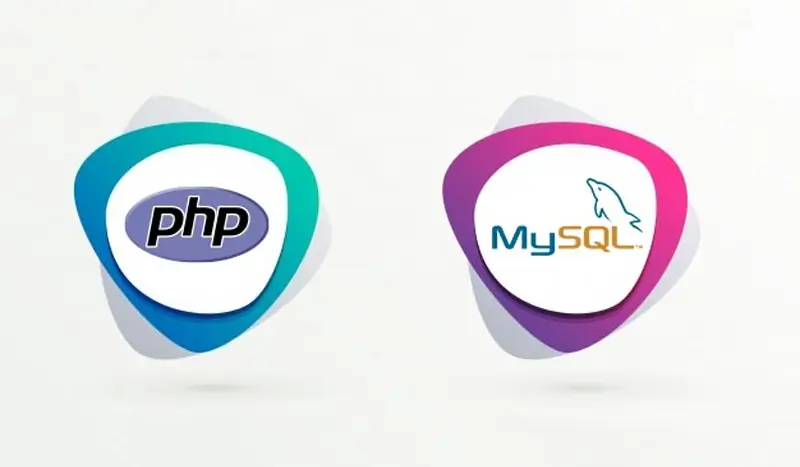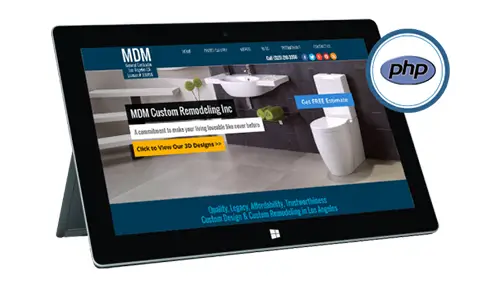PHP – the most popular web app programming language
PHP is a scripting language, which is what we in the web development business use to create interactive websites with. It’s part of a website’s underlying code (i.e. the gobbledygook that’s invisible to regular people) and it tells your browser program how to display the website features & functions that you interact with.
You might be familiar with another term called HTML. It’s the most common and basic kind of web language, but it’s also rather limited in what it can do. HTML is used to display simple content & informational pages. PHP is better suited for interactive websites, high-end web development and online application development. Need a website you can update yourself, for example? If so, you’ll likely need a system built on PHP rather than purely on HTML.
The best thing about PHP is that it works alongside traditional HTML to create more robust websites. In the past, we used to embed our PHP scripts within normal HTML pages to enhance them with more advanced features. But now we build websites on a PHP framework from the very beginning, arming you with many more options and features than would be available with an HTML as a base. With that kind of PHP framework, the possibilities for your website become virtually endless.
MySQL Defined
Before we delve into a formal definition, you might want to know how the heck to pronounce MySQL. There are two ways, actually. The most literal locution is easy enough: “My S-Q-L.” But if you prefer a more conversational tone when talking technology, you can also say, “My Sequel.” We’ll know what you mean either way.
In simple terms, MySQL is a database management system. There are a lot of reasons to build databases as part of website infrastructure. Email accounts, blogs and content management systems (CMS) are all great examples of highly desirable web assets that we create for our clients using MySQL-managed databases. PHP and MySQL work hand-in-hand to create rich internet applications.
Like PHP, MySQL is also an open-source technology, a fact that should inspire a lot of confidence for business owners.
Open-Source Benefits of PHP and MySQL Web Development
When software or other technologies are described as “open-source,” it generally means that their creators have chosen not to keep their coding a secret. Whereas some programs you purchase will encrypt their source code to prevent replication or modification, open-source programs encourage users to utilize, scrutinize and customize the code (usually pursuant to a particular license agreement).
The benefits of using open-source technology are numerous. Paramount among the advantages is reliability. Open-source coding has been checked and doubled checked by thousands or even millions of people around the world. Its intricacies have been tested and improved over the years, and if problems arise, they’re easy for third parties to remedy. You won’t have to wait for the original commercial vendor to sell you a new version just to fix a pesky bug, nor will you get stuck with a single vendor’s proprietary technology which is a real advantage.
Popular Websites Using PHP and MySQL Web Development
Another advantage of using open-source technology? Keeping yourself in good company! At Oditek Solutions, we construct most of our clients’ websites using PHP and MySQL… and we certainly aren’t alone in that! PHP and MySQL web development is actually the driving force behind many of the Internet’s most popular and successful sites, including ones you visit every single day.
Here’s a look at just a few of the popular web destinations that are constructed using PHP and MySQL web development:
- WordPress
- Yahoo!
- Flickr
- Wikipedia
Why Choose PHP and MySQL Web Development
Cost Competitive
Both PHP and MySQL are open-source and free, with no significant learning curve. This combined technology helps to maintain a very competitive cost of the development.
Robust Community Support
The users will get constant support from a burgeoning community of developers that are spread all over the world.
Time Tested
PHP and MySQL are time tested, and web scripting languages that are powering millions of web apps across niches.
Sophisticated And Useful
PHP and MySQL development always provide sophisticated web apps to clients with ease of use, clean interface, and glitch-free performance.
Versatile And Customizable
PHP and MySQL are well-equipped with a set of tools and deliver a rich set of modern features and functionalities, along with a highly customized user experience.
Scalable And Flexible
These both languages are scalable and flexible that delivers business-specific features as well as capable of accommodating increasing traffic volume.
PHP And MySQL Web Development Best Practices
One item to note: No matter how great the development tools are that you are developing with, if the application is not developed correctly, the end result may not be worthwhile. PHP and MySQL are built so that anyone with a minimum amount of programming knowledge can put together a browser-based web application. This easy entry to PHP development can also create problems when an inexperienced programmer takes on a large Web Application project and does not consider security implications, scalability and the SQL execution time when there are large concurrent connections, just to start.
Examples of messy coding and sloppy SQL queries:
- Not using coding guidelines
- Mixing HTML with PHP functions
- Coding inconstancies
- Using different styles of function calls
- Disordered logic
PHP and MySQL aren’t novice technologies, but in the hands of an expert, they can aid in the most sophisticated website development you can imagine. At Oditek Solutions, we have more than a decade of experience in PHP and MySQL web development. We specialize in using these tools to build complex and fully customized websites for clients all over the world.
Don’t settle for an underwhelming website. Let us flex our technological might on your business’ behalf. To find out more, just send us an email to speak with a PHP / MySQL Specialist.







